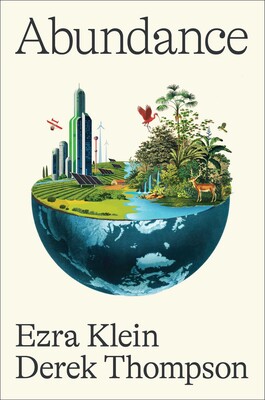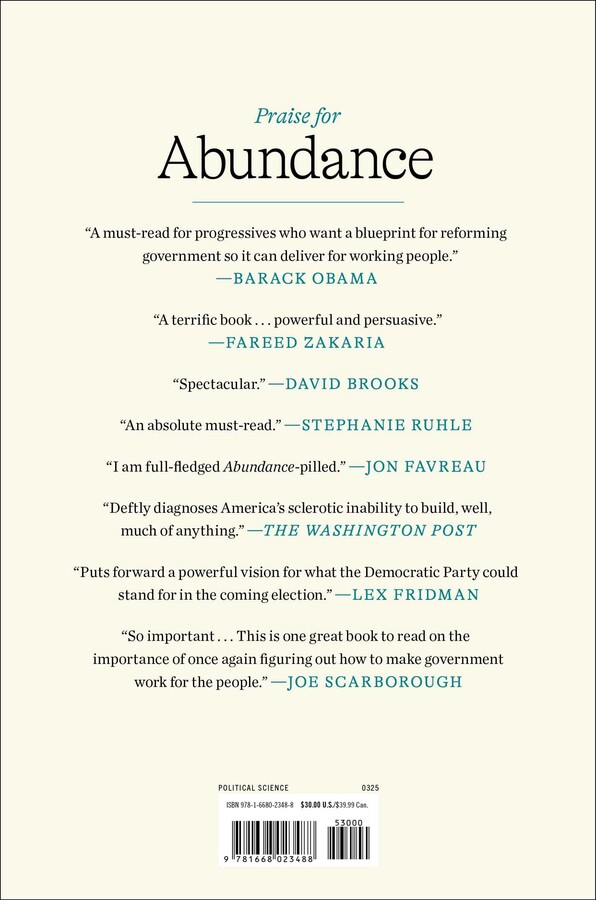Plus, receive recommendations and exclusive offers on all of your favorite books and authors from Simon & Schuster.
Abundance
LIST PRICE $30.00
Get 30% off hardcovers with code MOM30, plus free shipping on orders of $40 or more. Terms apply.
Buy from Other Retailers
Table of Contents
About The Book
“A terrific book...Powerful and persuasive.” —Fareed Zakaria
“Spectacular…Offers a comprehensive indictment of the current problems and a clear path forward…Klein and Thompson usher in a mood shift. They inspire hope and enlarge the imagination.” —David Brooks, The New York Times
From bestselling authors and journalistic titans Ezra Klein and Derek Thompson, Abundance is a once-in-a-generation, paradigm-shifting call to renew a politics of plenty, face up to the failures of liberal governance, and abandon the chosen scarcities that have deformed American life.
To trace the history of the twenty-first century so far is to trace a history of unaffordability and shortage. After years of refusing to build sufficient housing, America has a national housing crisis. After years of limiting immigration, we don’t have enough workers. Despite decades of being warned about the consequences of climate change, we haven’t built anything close to the clean-energy infrastructure we need. Ambitious public projects are finished late and over budget—if they are ever finished at all. The crisis that’s clicking into focus now has been building for decades—because we haven’t been building enough.
Abundance explains that our problems today are not the results of yesteryear’s villains. Rather, one generation’s solutions have become the next generation’s problems. Rules and regulations designed to solve the problems of the 1970s often prevent urban-density and green-energy projects that would help solve the problems of the 2020s. Laws meant to ensure that government considers the consequences of its actions have made it too difficult for government to act consequentially. In the last few decades, our capacity to see problems has sharpened while our ability to solve them has diminished.
Progress requires facing up to the institutions in life that are not working as they need to. It means, for liberals, recognizing when the government is failing. It means, for conservatives, recognizing when the government is needed. In a book exploring how we can move from a liberalism that not only protects and preserves but also builds, Klein and Thompson trace the political, economic, and cultural barriers to progress and propose a path toward a politics of abundance. At a time when movements of scarcity are gaining power in country after country, this is an answer that meets the challenges of the moment while grappling honestly with the fury so many rightfully feel.
Appearances
Reading Group Guide
Get a FREE ebook by joining our mailing list today! Plus, receive recommendations for your next Book Club read.
Ezra Klein & Derek Thompson
This reading group guide for Abundance includes an introduction, discussion questions, and ideas for enhancing your book club. The suggested questions are intended to help your reading group find new and interesting angles and topics for your discussion. We hope that these ideas will enrich your conversation and increase your enjoyment of the book.
Introduction
To trace the history of the twenty-first century so far is to trace a history of unaffordability and shortage. The crisis that’s clicking into focus now has been building for decades—because we haven’t been building enough. Abundance explains that our problems today are not the results of yesteryear’s villains. Rather, one generation’s solutions have become the next generation’s problems.
Progress requires facing up to the institutions in life that are not working as they need to. It means, for liberals, recognizing when the government is failing. It means, for conservatives, recognizing when the government is needed. In a book exploring how we can move from a liberalism that not only protects and preserves but also builds, Klein and Thompson trace the political, economic, and cultural barriers to progress and propose a path toward a politics of abundance. At a time when movements of scarcity are gaining power in country after country, this is an answer that meets the challenges of the moment while grappling honestly with the fury so many rightfully feel.
Topics & Questions for Discussion
1. In the introduction, the authors draw a distinction between ideological disagreement and ideological collusion. What are these concepts, and how do they differ? Why do the authors find the former misleading, and why do they think the latter is a more accurate diagnosis for the problems facing American political governance?
2. “To have the future we want, we need to build and invent more of what we need. That’s it. That’s the thesis. It reads, even to us, as too simple” (page 4). In the conclusion, the authors revisit this theme of simplicity: “Abundance reorients politics around a fresh provocation: Can we solve our problems with supply? Many valuable questions bloom from this deceptively simple prompt” (page 219). Why does a simple thesis raise eyebrows? Think about why the authors are writing this book. How might the adoption of a simple thesis, as opposed to a complex one, serve their aims?
3. Pay attention to the sources that are referenced throughout this book. What kinds of training and credentials do their authors have, and what kinds of methodologies do they use? Describe the way the authors of Abundance bring them into conversation with one another.
4. The authors try to disprove some commonly held assumptions about the causes of homelessness. What are these assumptions? Who benefits from their existence?
5. How do people use zoning to preserve community character and how does this tactic depart from the preexisting ways people used to curate community? (Think about the authors’ discussion on page 27 of the ecosystems of talent that are located within some cities, such as New York).
7. On page 102 the authors claim that “The government is a plural posing as a singular.” What key government players and factions feature in this book? Identify a few types of conflicts that exist between different groups within the government. Why do they exist?
8. In chapter 3 the authors claim, “The big government–small government divide is often more a matter of sentiment than substance” (page 105). Define these two words, “sentiment” and “substance.” What does the substitution of substance with sentiment reveal about the specific way in which American politics is changing? What are some spaces where politics might find itself today in America that it would not have occupied a few decades ago?
9. To illustrate America’s supply-side problems, the authors spend much of the first half of the book discussing housing affordability. Why do you think they make housing their case study of choice?
10. In chapter 4 the authors raise some problems besetting America’s technology companies and other research and development organizations. Why is it important for them to approach this section through a historical lens? What would they overlook if they only described the way those organizations operate today?
11. One of the authors’ major contentions is that the policies and procedures we adopt in one generation are central to the problems that we face in the next. The authors state in their conclusion, “Political movements succeed when they build a vision of the future that is imbued with the virtues of the past” (page 221). Discuss some of the ways people conceive of the past as it figures in politics. Why might political groups struggle to act consistently across generations?
12. Where do discussions like the ones in this book take place today? Who are the loudest pundits? Who is missing from them? How does your experience change when reading this conversation in a book as opposed to having it in person?
13. Did you have any reservations about the points the authors make? Are there any comparable books you’ve read to this one that offer a different perspective?
14. Notice the centrality of “choice” in this book. For instance, the authors state that crises often create periods of greater efficiency and innovation, but we first choose what we consider to be a crisis. Who makes these choices? Do you feel like you have the ability to participate in that process?
15. Share some of the ways you are personally affected by the problems outlined in this book. Has your perspective on them changed?
Enhance Your Book Club
1. The year is 2035 and the world has implemented most of the proposals Abundance raises. Now, it is up to you to write the follow-up. How might the world have changed, and what concerns would you still have?
3. Split off into small groups. Take one domain each (think: technology, education, political governance, arts, and more) and describe, with as much detail as possible, how it would ideally change within 5-, 10-, and 20-year increments. Share your thoughts with the group
Product Details
- Publisher: Avid Reader Press/Simon & Schuster (March 18, 2025)
- Length: 304 pages
- ISBN13: 9781668023488
Browse Related Books
Raves and Reviews
“Spectacular . . . Offers a comprehensive indictment of the current problems and a clear path forward . . . Klein and Thompson usher in a mood shift. They inspire hope and enlarge the imagination by describing the good things that are actually within our grasp: abundant energy, cheaper housing, affordable cities, shorter workweeks, lab-grown meat so that we no longer have to use 25 percent of global land to raise livestock.” —David Brooks, New York Times
“A terrific book . . . powerful and persuasive . . . People will recruit [Klein and Thompson] to run the Democratic Party.” —Fareed Zakaria, CNN
“Ambitious . . . Klein and Thompson want a ‘liberalism that builds,’ not just in housing and green energy but in artificial intelligence and in drug development, too, areas where they see similar patterns of stagnation. Their goals are broad. This group of policies, which they call the abundance agenda, offers, Klein and Thompson believe, ‘a path out of the morass we’re in. A new political order’ . . . Abundance is a fair-minded book, and it recognizes some of the trade-offs that come with redesigning government for dynamism.” —Benjamin Wallace-Wells, The New Yorker
“An absolute must-read.” —Stephanie Ruhle, MSNBC
“Klein and Thompson are two of the smartest voices from their generation of policy-oriented journalists, moving beyond horse race coverage of politics and integrating serious social science into political commentary. . . . [Their] vision for more effective government is something like an anti-DOGE: They imagine a future United States where careful and informed elected officials find ways to strip back the barriers to effective policy and allow the government to invest efficiently in underdeveloped pockets of society.” —Julian Zelizer, The New Republic
“A potent political manifesto . . . Its optimism is also compelling, even joyous. . . . The book’s core lesson, convincingly delivered, is that liberals ought to make it easier to do the things they want to do. . . . A can-do antidote to blue-state malaise . . . The timing of Abundance is extraordinary.” —Slate
“Helping liberals get out of their own way . . . It’s time to scrutinize everything from municipal zoning regulations to the paperwork requirements for scientists getting federal funding. The authors’ debut as a duo is very smart and eminently useful. Cogent, well-timed ideas for meeting today’s biggest challenges.” —Kirkus Reviews (starred review)
“Deftly diagnoses America’s sclerotic inability to build, well, much of anything across multiple domains in the physical world. . . . Trump supporters in Silicon Valley love saying ‘it’s time to build,’ and here are some influential liberals who wholeheartedly agree. . . . The nascent abundance movement is a tailwind for a broad effort that pro-growth conservatives can and should work with. . . . The modern right might not like everything Abundance has to offer, but it sure beats a bipartisan program of artificial scarcity.” —James Pethokoukis, Washington Post
“A guide for liberals shaken by an age of factional polarization . . . [Klein and Thompson] are the best in the business at digesting and synthesizing expertise from a host of fields. . . . Abundance might inspire a demoralized Democratic Party to think big again.” —Samuel Moyn, New York Times Book Review
“A forceful, quick-moving broadside against the left-coded pathologies they see as standing in the way. . . . Klein and Thompson’s diagnosis gets much right. . . . A worthy read.” —Financial Times
“Ezra Klein and Derek Thompson want you to hold space to dream about utopia. No need to tighten the belt, they argue: We have everything we need to build the future that liberals want, clean energy and affordable housing included, today! Their book explains how.” —New York Times
Resources and Downloads
High Resolution Images
- Book Cover Image (jpg): Abundance Hardcover 9781668023488
- Author Photo (jpg): Ezra Klein Lucas Foglia(0.1 MB)
Any use of an author photo must include its respective photo credit
- Author Photo (jpg): Derek Thompson Shaughn and John, Inc(0.1 MB)
Any use of an author photo must include its respective photo credit
















